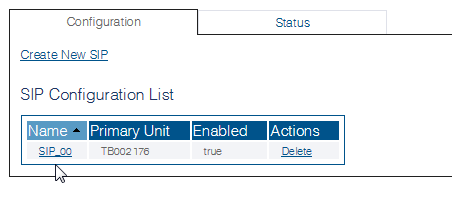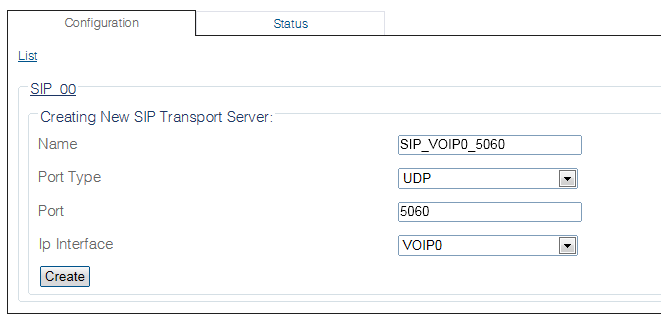Toolpack:Creating a SIP Transport Server D
From TBwiki
(Difference between revisions)
(Created page with "=== '''''Applies to version(s): v2.9.''''' === {{DISPLAYTITLE:Creating a SIP Transport Server}} After you create a SIP stack, you must must create a new SIP transport server f...") |
(Northbound Interface content) |
||
| Line 50: | Line 50: | ||
'''Parameters (text)''' | '''Parameters (text)''' | ||
<pre> | <pre> | ||
| + | /configurations/@[configuration_name]/sip_stacks/@[sipStack_Name]/transport_servers/@[sipTransportServer_name] | ||
| + | ip_header_tos = 0 | ||
| + | ip_interface = "@[hardware_name].@[voip_Name]" | ||
| + | name = "@[sipStack_Name]" | ||
| + | port = 5060 | ||
| + | port_type = "UDP" | ||
</pre> | </pre> | ||
'''Parameters (json)''' | '''Parameters (json)''' | ||
<pre> | <pre> | ||
| + | { | ||
| + | "ip_header_tos" : 0, | ||
| + | "ip_interface" : "@[hardware_name].@[voip_Name]", | ||
| + | "name" : "@[sipStack_Name]", | ||
| + | "port" : 5060, | ||
| + | "port_type" : "UDP" | ||
| + | } | ||
</pre> | </pre> | ||
</div> | </div> | ||
Revision as of 16:04, 22 December 2015
Applies to version(s): v2.9.
After you create a SIP stack, you must must create a new SIP transport server for your SIP configuration.
Note: In order to employ SIP transport servers, the protocol that they will use to transport the SIP signaling traffic must be defined.
To do so:
1- Click SIP in the navigation panel
2- Select a SIP stack for which you wish to create a transport server
3- Click Create New Transport Server
4- Create the new SIP transport server:
- Enter a name for the server
- Select an appropriate port type
- Select an appropriate IP interface
- Click Create
5- Verify that the "SIP transport server was successfully created" message appears, and that the new server is listed in the Transport Servers list
Path
Parameters (text)
/configurations/@[configuration_name]/sip_stacks/@[sipStack_Name]/transport_servers/@[sipTransportServer_name] ip_header_tos = 0 ip_interface = "@[hardware_name].@[voip_Name]" name = "@[sipStack_Name]" port = 5060 port_type = "UDP"
Parameters (json)
{
"ip_header_tos" : 0,
"ip_interface" : "@[hardware_name].@[voip_Name]",
"name" : "@[sipStack_Name]",
"port" : 5060,
"port_type" : "UDP"
}




